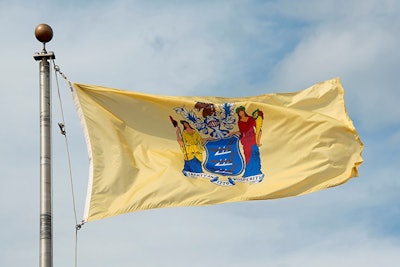
Following Gov. Phil Murphy taking office Jan. 16, adult-use marijuana could soon be a reality in New Jersey.
Democratic State Sen. Nicholas Scutari introduced NJ S830 to legalize the recreational use of marijuana by those 21 and older on Jan. 9, the day the new session of the Democratic-led legislature convened and one week before Murphy took office. The new governor promised on the campaign trail to legalize adult-use in the state, saying that the industry could result in about $300 million in new revenue, according to U.S. News & World Report.
On Jan. 23, only a week into his term, Gov. Murphy ordered a 60-day review of the state’s tightly regulated medical marijuana program and said he would consider expanding it to allow home delivery, purchases greater than two-ounces and more licensed dispensaries, NJ.com reports.
If passed, the adult-use legislation would establish a Division of Marijuana Enforcement to regulate the industry, establish a sales tax that would rise from 7 percent to 25 percent over five years and permit individual possession of up to one ounce of marijuana.
In 2018, Scutari said, events have aligned for the impending legalization debate in the General Assembly.
“Without the inauguration of Gov. Murphy, we wouldn’t be talking about this,” Scutari told Cannabis Business Times. “I’ve been talking about this bill for years. This is not something that [Murphy] was starting to campaign on, but I brought it to his attention early on—had a couple of meetings with him. He read up on the topic, got himself educated on the pros and cons and came to what I consider the only logical conclusion that legalization is the best way to go for New Jersey residents.”
Scutari’s new bill is identical to one he introduced during the 2016-2017 session under former Republican Gov. Chris Christie, a staunch opponent of marijuana legalization.
Democratic Assemblyman Reed Gusciora is a co-sponsor of the House version of Scutari’s bill, but he also plans to introduce his own legislation around Feb. 1. Reports suggest that Gusciora’s bill will allow home cultivation and the possibility of limited adult-use sales starting later this year, according to NJ.com. “We think [Scutari’s bill] is good,” Gusciora’s chief of staff, Brendan Neal, told Cannabis Business Times. “We will be introducing a bill that we think is better.”
“We vowed to work together to get the best bill possible to the governor’s desk,” Scutari said, noting that he worked with Gusciora on New Jersey’s medical marijuana bill in 2010. “Essentially, his bill is my bill with some changes to it. I’m open-minded to some changes to improve the bill. There are certain things we won’t be able to change, but we’ll get the bill on the same page. I’m happy. I hope 10 people introduce different versions of the bill.”
Adult-use legalization in the state is expected to face opposition from lawmakers, NJ.com reports, with some senators vowing to vote “no” on any bill to allow recreational marijuana use, but public support is strong.
A September 2017 Quinnipiac University poll of New Jersey voters showed 59-percent support for “allowing adults to legally possess small amounts of marijuana for personal use.” That statistic tracks with national trends on the subject. A recent poll conducted by Mason-Dixon Polling and Strategy and released by anti-legalization group Smart Approaches to Marijuana (SAM) shows the majority of Americans are opposed to current federal marijuana law, with 49 percent of respondents backing full legalization.
“It never ceases to amaze me, the level of excitement that people have regarding the potential to legalize marijuana—the people who are interested in the topic, interested in the job opportunities, the economic development, the social injustices of prohibition of marijuana,” Scutari said. “I’ve never seen anything have so much effect on members of the general public in terms of excitement and interest in what we’re doing in government.”
The American Civil Liberties Union (ACLU) of New Jersey and New Jersey United for Marijuana Reform (NJUMR) have been speaking to the public and local and state officials about the importance of marijuana legalization, emphasizing it as a racial and social justice issue, said Dianna Houenou, policy counsel for the ACLU of New Jersey and a founding member of NJUMR.
“We see the fact that blacks in New Jersey are arrested at a rate that’s three times higher than whites, as indicative of a civil rights crisis,” Houenou said. “Through legalization, we can begin to address the harms that have been inflicted on our communities by marijuana prohibition, and we can develop a strongly regulated industry that accounts for those harms, reinvests money into communities and provides New Jerseyans with meaningful chances to participate in this new industry.”
New Jersey’s current bill outlines the regulations that will be further developed by the Division of Marijuana Enforcement should the legislation pass, Houenou said, and requires rules for product testing, labeling, packaging and advertising. Some specifics—such as how much THC is permitted and that edibles must be packaged in individual serving sizes—are addressed in the legislation, she added.
Regarding legalization opposition, Houenou said it demonstrates that the ACLU and NJUMR still have a lot of educating to do, and that proper regulation can address some concerns expressed by opponents, such as the need for more drug treatment and prevention programs.
The ACLU and NJUMR will continue their efforts to ensure the state legislature passes a bill that focuses on social justice, and that the legislation is signed by Gov. Murphy, Houenou said.
“Murphy has many times on the campaign trail and during his inaugural remarks on Tuesday indicated he is still very much supportive of signing a bill to legalize marijuana, and he views this as a social justice matter,” she said.
Although more education and myth-busting are needed, Houenou remains optimistic about legalization.
“We’ve got some work to do in making people understand what marijuana is and isn’t, but I’m confident that we can reach our goals,” she said, adding that the state is not deterred by the Department of Justice’s recent policy change.
“We’re definitely going to press ahead. Our legislative leadership has indicated that they are not letting Jeff Sessions’ decision affect how we’re going to proceed here in New Jersey, and we can’t let this slow us down,” she said.
U.S. attorneys across the country have indicated that they will not change the way they have been doing their jobs to start prosecuting state compliant businesses. New Jersey will look to states with legal programs in place to ensure adult-use legalization rolls out smoothly, Houenou said.
Top image: © jiawangkun | Adobe Stock


























